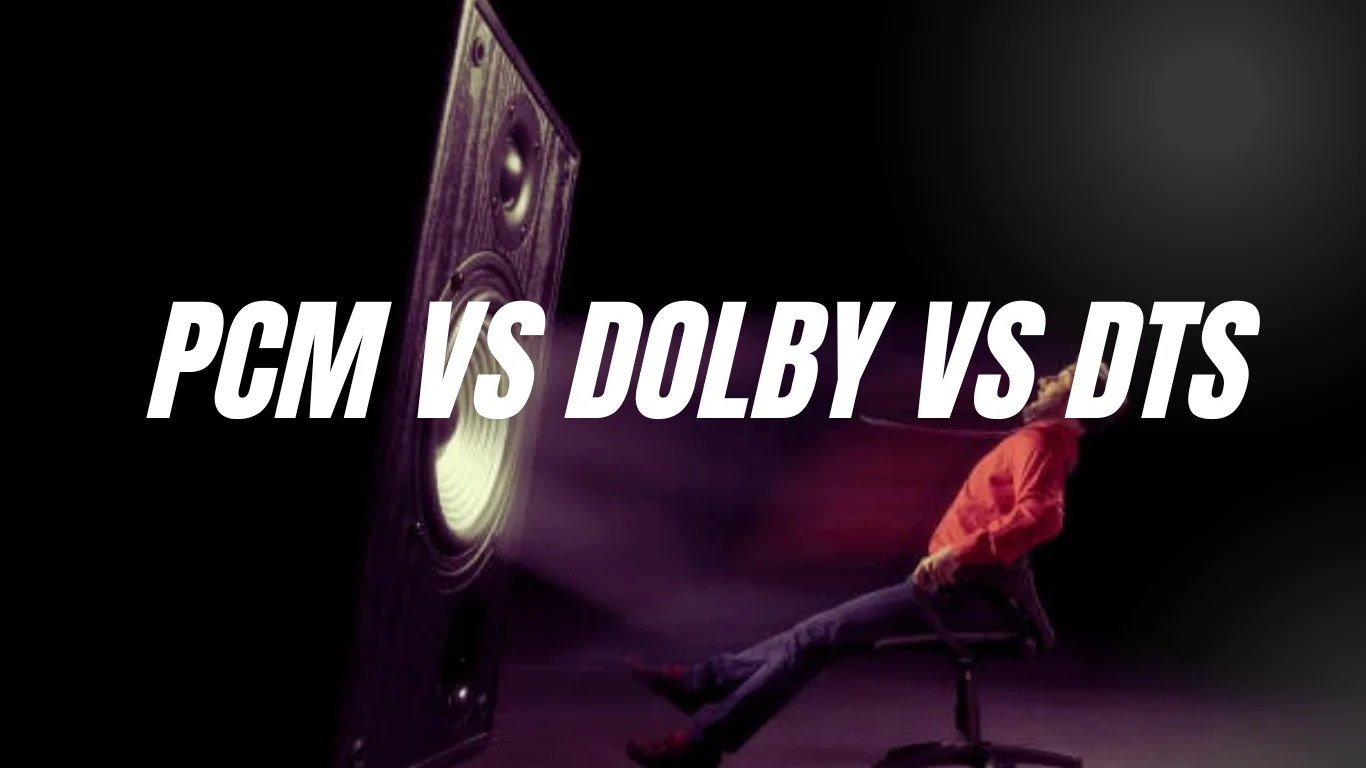The sound quality of movies, video games, and music can be frustrating when it’s subpar. We know the feeling. If your audio setup is about as basic as it gets, and you are wandering in the audio wilderness, and clueless about whether to choose PCM, Dolby, or DTS. There is a lot of jargon in the world of cinema, gaming, and audiophile sound, especially when you’re stuck with limited tech and know-how. No worries, Team Wooster Audio promises to shed light on which audio format reigns supreme in different scenarios.
Let’s get started. We will adequately learn about How to choose from PCM and Dolby Atmos and DTS for audio quality according to personal preferences.
What Is PCM And How It Works?
To begin, I will tell you about PCM (Pulse Code Modulation), which is a Digital audio method in which analog audio (sound) is converted to digital format. From Personal Computers to CD player devices, the PCM method is the go-to for converting uncompressed audio, and according to Experts, the sound quality is always higher. PCM samples sound regularly, assigns it digital values, and the bit depth affects quality and directly in competition; DSD is a much stronger competitor of PCM as well, which we will discuss below.
Understanding Dolby: An Exploration of its Functionality
As far as cinema is concerned, Dolby is the rock star. They’ve cooked up cool stuff like Dolby Digital, Dolby Atmos, and Dolby Surround to give us top-notch sound in cinemas and home theaters. Unlike PCM, Dolby is compressed audio and gives you the sense to think about sitting in a theater with surround sound, making you feel like you’re right there with actors like Dwayne Johnson or Clint Eastwood (My Favorite). Yeah, that’s Dolby’s magic, which has a bit rate of 768 Kbits only.
What Is DTS And How It Works?
After Dolby, I will tell you about DTS (Digital Theater Systems), which are also compressed audio and much like Dolby. In DTS, codecs and formats for audio exist in many forms, and some popular ones are DTS:X, DTS-HD Master Audio, etc. So below, we will show you How DTS is better than Dolby (bit rate of 1.5 Mbits over Dolby), so clear your concepts properly. Expert Says, that both techniques of DTS and Dolby have the capability to shrink an 8.3GB PCM file down to about 800MB, but the main thing is audio quality, which also decreases.
Chart of Comparisons For Dolby Vs DTS Vs PCM Below
In the next few sections, Team Wooster Audio will give you a breakdown of PCM, DTS, and Dolby so you can get an idea of the basics.
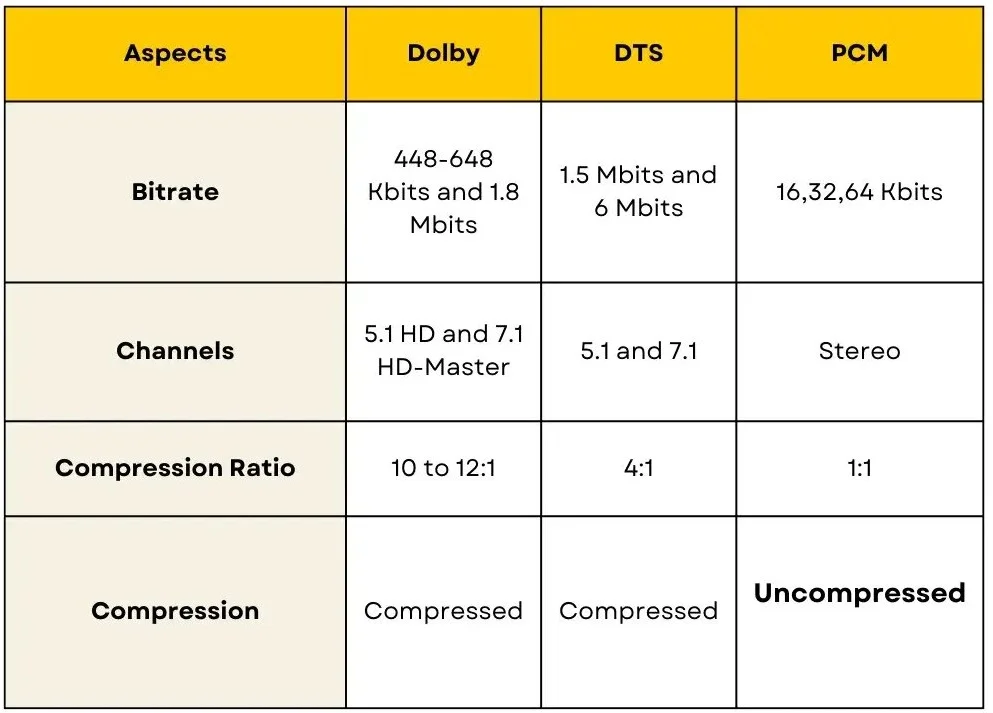
Chart Of Comparisons For DTS and Dolby
This chart shows you what DTS and Dolby are and their differences so that you can better understand both audio formats. Note: Unless you carefully understand both charts, you cannot comprehend audio formats deeply.
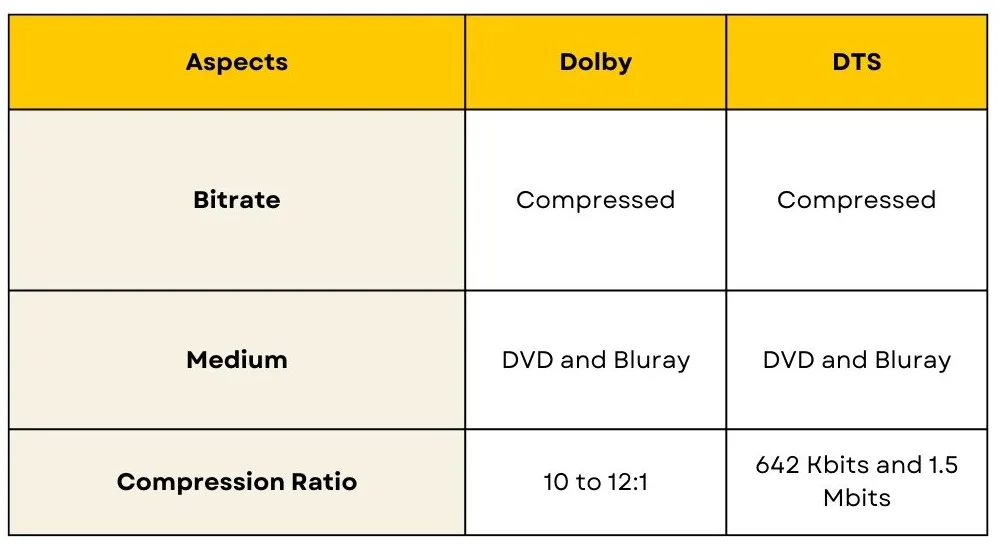
Film enthusiast Perspective
There is no doubt that immersion and spatial audio are essential to many movie fans, according to research (Cinematic experience is significantly enhanced). Instead of PCM (which costs you more), using Spatial audio would be a better option if you use technologies like DTS: X or Dolby Atmos only and also cost you less. Film enthusiasts often enjoy immersion in the audio space because spatial audio adds height and depth.
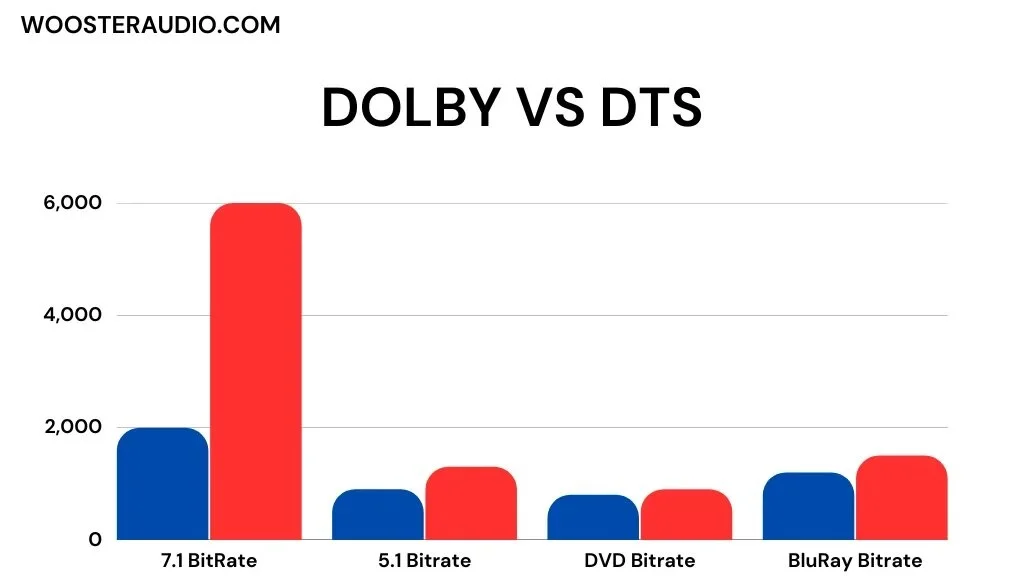
DTS Vs Dolby Which One Is Better In Audio Immersion?
DTS Audio Format
Let’s learn about DTS. Due to higher Bitrate, DTS provides higher audio fidelity and offers object-based audio, which enables sound coming from Films to move freely in a three-dimensional space to immerse you in a lifelike audio experience.
As a competitor to Dolby, DTS exists, resulting in innovation and improved quality in both formats. For better immersion, DTS: X offers audiophiles 1.5Mbits, which is a much higher bitrate, but according to experts, the Speakers Placement is the most important part.
Many home theater systems and Blu-ray players support DTS:X, making it accessible to consumers who want an immersive audio experience. A lot of Blu-ray players and home theater setups out there are totally on board with DTS: X. Basically, you can easily set up DTS: X by using a 7.1 or 5.1 setup; that is why movie enthusiasts find DTS:X more suitable for Home Cinema and theaters.
Dolby Audio Format
If we talk about Dolby, this one is a widely recognized and highly regarded immersive audio format, but in comparison with what DTS experts say, sound quality from Dolby is not superior and more efficient than DTS (Due To Require Speaker Placement). For object-based audio technology, Dolby is much popular in the market and gives more immersion, so that is why Cinema Hall Owners install Dolby Atmos in theaters.
Note: Why audio lovers prefer Dolby Atmos over DTS only due to Speaker Placement. There are also Dolby Atmos Ceiling Speakers in the market, which you can install to the Ceiling of your Home Theater or Home Cinema System at a low cost. These Dolby Atmos soundbars are good for home cinema setups.
Dolby Atmos Vs DTS: Who Is Winner (For Cenima Grade Audio Quality)?
If you are a Cinephile, then you know better than compromising on immersion is not a better choice for enjoying the latest movies in the Cinema. According to Team Wooster Audio’s final decision, Dolby Atmos Won this Match due to top-quality audio immersion only. Whereas If your OWN Home Cinema is set up, you can also go far with DTS: X because it provides better audio quality with less immersion.
Viewpoint Of An Audiophile
Audiophiles tend to think differently than cinephiles according to sound compression (Audiophile Dislike compression). But did you notice in the Graph Chart that both DTS and Dolby are compressed? If Yes, then a question comes to your mind: If Dolby And DTS are compressed audio formats, then audiophiles will not like them? The answer is Yes; audiophiles' choices are different, and instead of Dolby or DTS, they prefer High-Resolution PCM, which we will show you how.
PCM and DSD Audio Format
We Will Compare PCM (Pulse Code Modulation) and DSD (Direct Stream Digital) audio formats by understanding their differences and contexts of usage, so let’s get started.
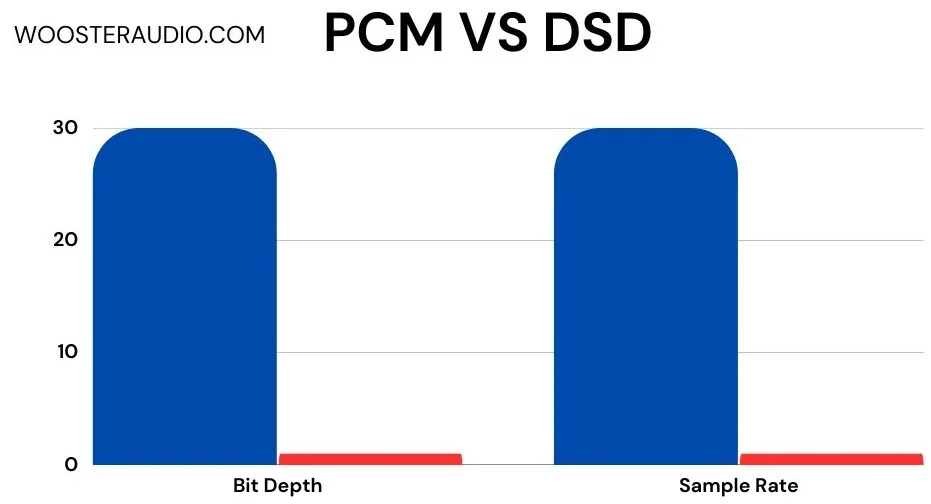
Encoding Method
In Simple Words, the PCM is a linear digital audio format and quantized analog audio signals at regular intervals. If we talk about DSD, it uses a 1-bit encoding scheme and a much higher sample rate than PCM. The DSD records the difference between successive samples (resulting in a bitstream).
Sample Rate
If we talk about PCM Sample Rate, you will get a wide range, including 44.1 kHz (CD quality),48 kHz (Digital Audio),96 kHz, 192 kHz, and beyond, but as compared to DSD, it is lower. Remember that to capture a greater range of frequencies, the sample rate should be higher. The Sample rate of DSD is fixed at about 2.8224 MHz (DSD64), and if you require greater detail, then here are the DSD128 (5.6448 MHz) and DSD256 (11.2896 MHz) sample rates for your understanding.
Bit Depth
The Bit depth of PCM is 16-bit and 24-bit, and of DSD is only 1-bit. So, as for precise quantization of the audio signal there is always a higher bit depth, which only PCM has so that you can get an idea about the winner.
PCM Vs DSD: Who Is Winner?
Both PCM and DSD are winners. The only thing is PCM won in reality, and DSD won in theory. If you calculate and compare the DSD sample rate theoretically, then it has more than PCM. After calculation, when Wooster audio scientist tested sound quality, in reality, she found some different things. Below are Human Ear sound perceiving frequency range mentioned:
- 20Khz sounds (With No Frequency Loss)
- With Ear Frequency of 2-2.5x (Get Max details)
- 2.5 and 96Khz (Overkill)
It is now clear why PCM has an advantage over DSD, and audiophiles recommend it. I will demonstrate the versatility of DSD and PCM in the paragraphs below.
DSD And PCM Versatility
PCM Versatility
- Support all platforms (MP3,WAV or FLAC)
- Most Audio Setups In the Market and DACs 80 Percent Support PCM format.
- PCM is more Versatile.
DSD Versatility
A continuous stream of pulses is stored in DSD encoding, making post-recording editing complex, unlike PCM, which uses discrete samples for easier manipulation. So, if you have a record DSD, then you cannot edit it.
A Gamer’s View Point
A research team led by Wooster Audio found that computer and console game players demand real-time, directional audio. But gamers lack how to select between Dolby, DTS and PCM for awesome surround sound audio quality. Regarding gaming audio, PCM falls short due to its lack of surround sound. The experts recommend looking into Linear PCM or LPCM, which is a kind of PCM but a bit trickier to set up for that surround sound goodness.
So We have two options: Dolby & DTS. The encoding process of both starts with encoding Multiple PCM channels > to > Bitstream. It doesn’t start decoding until it goes back to > PCM (only For Compression). For better audio gaming, you can also use DTS and Dolby with small sizes (For real-time audio)
Wooster Audio Experts will recommend you to use Dolby Atmos for a gaming audio experience. Why did we make this decision? Let me tell you. The general rule of best gaming audio quality is Higher bitrate and Encoding efficiency. As compared to DTS X, with a reach of 1.5 Mbits, Dolby Atmos features less reach of 768 Kbits.
I know you think DTS X has a Higher bitrate, but I am in support of Dolby, where it is proven that DTS X provides high audio quality? Right? Well, Dolby Atmos shows excellent popularity in the market, and most popular games like Gears 5, Metro Exodus or Borderlands 3 etc support Dolby Atmos. While just imagine if you use DTS: X, but your game doesn’t? That is why I am recommending you Dolby Atmos (Winner), which is the most supported audio format for vast games and streaming platforms. These top soundbars for Xbox series X gaming consoles will increase sound clarity.
Note: Some audio experts show Dolby Atmos is not set up and requires speaker placements, but they think people are stupid. It is not Rocket Science to set up Dolby Atmos, and I know it takes time, but it works for a long time.
In A Nutshell
To sum up, I trust you now grasp the distinctions among PCM, DTS, and Dolby formats. Each audio format has its own pros and cons, and we have pointed you in the direction of which audio format works best for you. So, If you are a gamer, cinema lover or music enthusiast, select audio formats that match your taste.
- Dolby Atmos: For Cinema Halls
- DTS X: For Home Cinema And Gaming
- PCM: For Audiophile
More Related For You!
